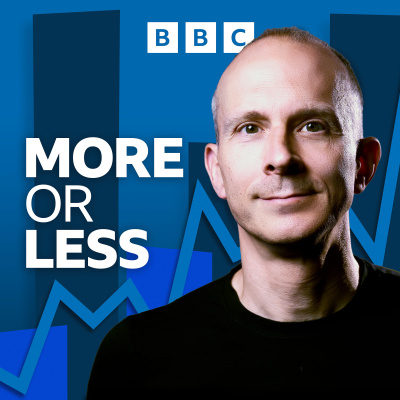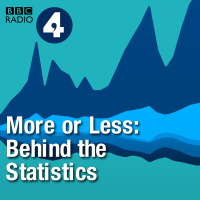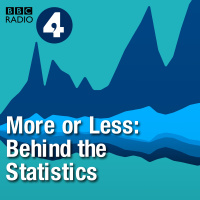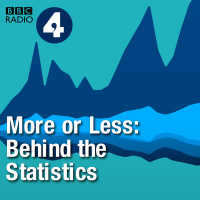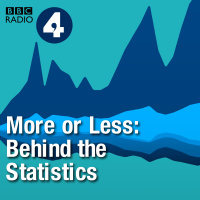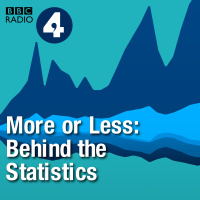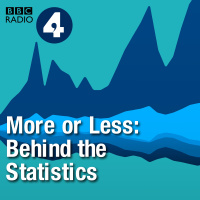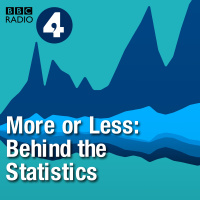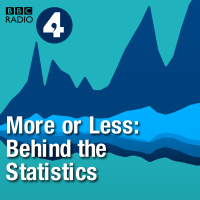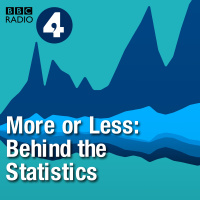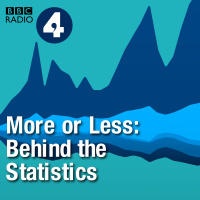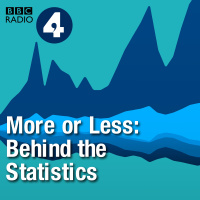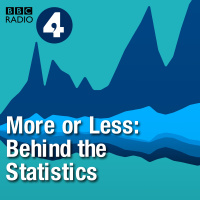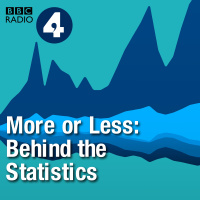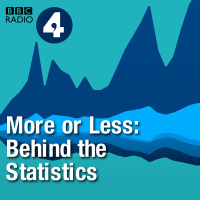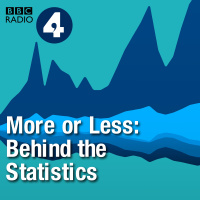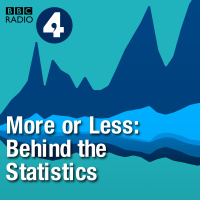Sinopsis
Tim Harford and the More or Less team try to make sense of the statistics which surround us. From BBC Radio 4
Episodios
-
Does it take 10,000 litres of water to make a pair of jeans?
09/07/2022 Duración: 10minVarious claims have been made about how much water is used in the production of a pair of jeans, that cornerstone of casual clothing. With growing worries over the environmental impact of denim production, More or Less decided to investigate - with the help of journalist and researcher Elizabeth L. Cline who has written extensively on sustainability and the fashion industry.
-
How many American women will have an abortion in their lifetime?
02/07/2022 Duración: 09minEarlier this month, the US Supreme Court overturned its 1973 ruling on Roe vs Wade - the case which guaranteed a constitutional right to a legal abortion across the US, sparking heated protests and debates across the country.But how many American women will have an abortion in their lifetime? One statistic circulating online puts it at as high as one in three. Reporter Charlotte McDonald has been looking into the figures and has uncovered some surprising statistics.
-
Covid climb, childcare costs and why can’t the French count properly?
29/06/2022 Duración: 29minCovid cases are rising once again – how accurately are official figures picking up the new wave and how worried we should be? We discuss inflationary spirals and how much wage and pension increases contribute to inflation. Also how many parents actually struggle with childcare costs? Can long waits at A&E be put down to the pandemic and why the French count differently to the British.
-
Ed Sheeran and the mathematics of musical coincidences
25/06/2022 Duración: 11minAfter beating a plagiarism claim in court, musician Ed Sheeran said that musical coincidences were inevitable with only 12 notes to choose from… but what do the numbers say? Mathematician and concert pianist Eugenia Cheng takes us through the mathematics of music and explains how the power of exponentials mean that just a handful of notes can open up a seemingly endless world of musical variety. Presenter: Tim Harford Producer: Nathan Gower Programme Coordinator: Janet Staples Sound Engineer: Neil Churchill
-
Rail strikes, tyre pollution and sex statistics
22/06/2022 Duración: 28minDo rail workers really earn £13,000 a year more than nurses? As rail strikes severely hit services we look at some of the claims being made around pay – and explain how you can measure average pay in different ways.Plus we investigate claims that Chancellor Rishi Sunak wasted £11bn by paying too much interest on Britain’s national debt.Is pollution from tyres really 2000 times worse than pollution from exhausts?And we look at sex and statistics in America.Produced in partnership with the Open University.Credits: Presenter: Tim Harford Series Producer: Charlotte McDonald Reporters: Nathan Gower, Jon Bithrey Production Coordinator: Janet Staples Sound Engineer: James Beard Editor: Richard Vadon
-
How often do people have sex?
18/06/2022 Duración: 08minMagazine articles and advice columns are commonly littered with spurious statistics about how much sex we’re having. So how much do we really know – and what are the difficulties of collecting information about such an intimate part of our lives? Doctor Marina Adshade from the Vancouver School of Economics, who specialises in the economics of sex and love, answers questions posed by a curious More or Less listener in Japan.
-
Maternity litigation, stars, bees and windowless planes
15/06/2022 Duración: 28minThe former Health Secretary Jeremy Hunt says that the cost of maternity litigation claims in England is now more than the cost of salaries for maternity nurses and doctors. We crunch the numbers and ask how worried parents and taxpayers should be. Also are there more bees in the world than stars in the galaxy? And would planes be much lighter if they didn’t bother with windows? Maths Professor Hannah Fry talks to us about her experience of cancer and the choices she and others have faced after a diagnosis. And we hear from author Simon Singh, who wants to bring fun maths conversations into homes everywhere.Produced in partnership with the Open University.
-
Hannah Fry: Understanding the numbers of cancer
11/06/2022 Duración: 10minBritish mathematics professor and broadcaster Hannah Fry has spent many years trying to explain the world through numbers. But when she was diagnosed with cervical cancer she embarked on a new mission – to discover whether the medical world, and we as individuals, make the right choices around treatment. Are patients always given the facts – and the time - they need to make rational decisions? And could we be at risk of unnecessary overtreatment?
-
Employment puzzle, pyramids and triplets
08/06/2022 Duración: 28minThe UK has a low unemployment rate, and a large number of people who are not working right now – we look at how both of these are true with the help of Chris Giles from the FT and Louise Murphy from the Resolution Foundation.Have pyramids really moved 4km south since they were built?For years, the media has been claiming that the odds of having identical triplets are one in 200 million – we are very suspicious. And we look at apparently concerning reports about women's life expectancy in the poorest parts of England.Plus, we have received a lot of emails from listeners about last week’s episode. Some questioning the definition of a billion, others questioning our explanation of the nautical mile. We do some reflecting.
-
Are girls starting puberty earlier?
04/06/2022 Duración: 08minIn the 1980s, Dr Marcia Herman-Giddens was one of the first people to notice that girls were starting puberty earlier than expected. We talk to Dr Marcia Herman-Giddens and Dr Louise Greenspan about what we know now about whether the age of girls’ puberty is falling. (Mother and daughter in the supermarket choosing sanitary items. Getty Images)
-
Jubilee costs, fuel poverty and imperial measures
01/06/2022 Duración: 28minIs the government really spending a billion pounds on the Jubilee, as some have claimed? We investigate some of the facts and figures around this week’s commemorations. We also ask why energy bills are becoming so high in the UK when we actually have plenty of gas, and we unpack the mystery of measuring fuel poverty. Plus after the Texas school shooting we investigate the statistics around gun deaths in the US.And finally we hear about the joys and perplexities of imperial measures with Hannah Fry and Matt Parker.
-
Noisy Decisions
28/05/2022 Duración: 08minNobel memorial prize winner Daniel Kahneman is one of the world’s most famous psychologists, known particularly for his work identifying the role of cognitive bias in everyday decision making. In this edition of More or Less he talks to Tim Harford about his latest book, Noise - A Flaw in Human Judgement, in which he outlines how a multitude of often irrelevant factors influence important decisions, whether in job interviews, the courtroom or workplaces generally - and what we can do about it.
-
Germany’s excess deaths, Eurovision and teacher shortages
25/05/2022 Duración: 29minSome recent, and surprising, estimates from the World Health Organisation suggested that the UK fared better than Germany in the pandemic. But did they get it right?At Eurovision this year an algorithm was apparently used to replace whole countries’ votes - was it responsible for the UK’s second-place finish?The global economy has been putting the squeeze on many of us this year. Various factors have caused food, fuel and energy prices to rocket and many households are starting to feel the pinch. We speak to economist Duncan Weldon about whether this year is the worst hit to the cost of living since records began.An unusually large contingent of children are set to hit English secondary schools just as the number of 21 year olds dips – so are we heading for a teaching crunch in England?Produced in partnership with The Open University.
-
Are just 100 companies responsible for 71% of global emissions and how stressed are South Africans?
21/05/2022 Duración: 08minIn the fight against global warming we’re constantly told to do our bit to reduce green house gas emissions. However, a claim circulating that just ‘100 companies are responsible for 71% of global emissions’ can make any individual effort seem futile. But does this claim mean what you think it means? We look into this and the claim that the pandemic pushed South African stress levels up by 56%. With guests Abbas Panjwani from Fullfact and Kirsten Cosser from Africa Check.(Image: Power plant emitting smoke at sunset. Credit: Enviromantic/Getty)
-
Did the WHO get some of its excess death estimates wrong?
14/05/2022 Duración: 08minThe World Health Organisation recently released some new estimates of the global death toll of the pandemic. But the figures for a few countries have caused controversy. Tim Harford speaks to Professor Jon Wakefield, who worked on the analysis - and Indian data journalist Rukmini S about the debate that’s erupted in India over the figures.(man puzzled at blackboard. Credit: Getty images)
-
Have the oceans become 30% more acidic?
07/05/2022 Duración: 08minAlthough the climate-changing effects of Carbon Dioxide emissions are well known, they are changing our oceans too, making them more acidic. But how much?Tim Harford explores the statistical quirks of ocean acidification, from pH to the mysteries of logarithmic scales. With Dr Helen Findlay from the Plymouth Marine Laboratory in the UK.
-
Sweden’s polarising pandemic response
30/04/2022 Duración: 08minWhen much of Europe went into lockdown at the start of pandemic, Sweden’s lighter touch strategy got lots of attention. Fans of the approach say it was a huge success that showed lockdowns were pointless. Opponents say it has been a disaster. But what do the numbers say?In this episode of More Or Less, Tim Harford and journalist Keith Moore carve a nuanced path through one of the pandemic’s most polarising approaches.
-
Understanding India through Data
23/04/2022 Duración: 08minHow do you go about understanding a country with a population as diverse as it is vast?Data journalist Rukmini S is the author of Whole Numbers and Half Truths: What Data Can and Cannot Tell Us About Modern India. Tim Harford spoke to her about the power and pitfalls of using statistics to make sense of modern India, from basic questions like average income to the huge challenges of keeping track of Covid.
-
Subitising and simplifying: how to better explain numbers
15/04/2022 Duración: 08minHave you ever looked at a numerical claim and thought ‘what on earth does that mean?’ Complex numbers are often badly communicated, making it difficult for the public to appreciate what they signify - but dial things down too much and you’re at risk of oversimplifying important issues. It’s a tightrope walk authors Chip Heath and Karla Starr have explored in their new book ‘Making Numbers Count’. Tim Harford talks to them about how we can improve the way we communicate numbers to the general public. Producer: Lizzy McNeill (Image: Child in front of numbers, Credit: Getty Images)
-
Did tea-drinking cut deaths in the Industrial Revolution?
09/04/2022 Duración: 08minCould an explosion in tea-drinking explain a decline in deaths in England during the industrial revolution? Professor Francisca Antman, an economist at the University of Colorado Boulder believes it might.Tim Harford discovers that dusting down the data from tea shipments and local burial records gives us surprising insight into how boiling water for tea accidentally improved public health. Presenter: Tim Harford Producer: Nathan Gower Sound Engineer: Graham Puddifoot
